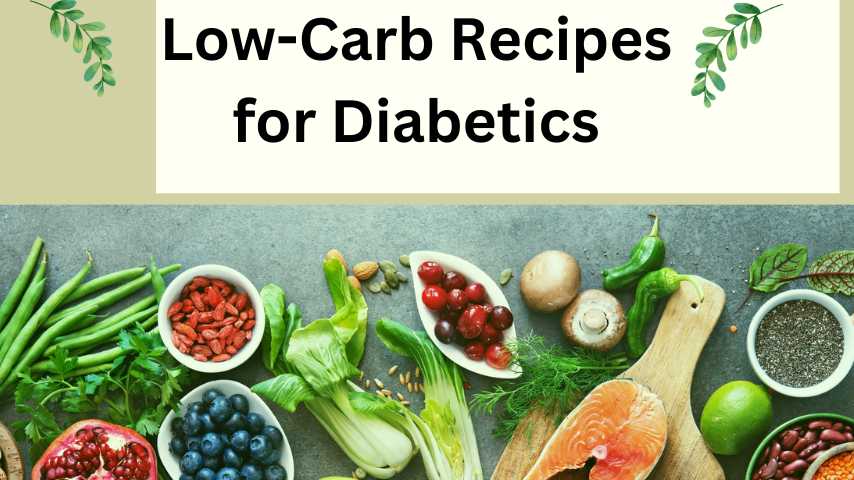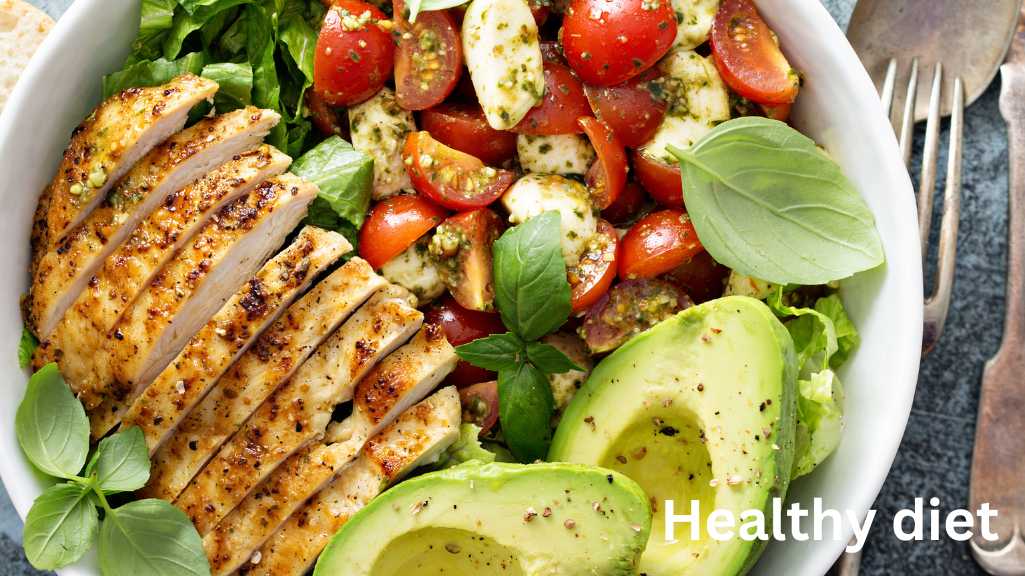Low-Carb Recipes for Diabetics is good for health. Diabetics must be additionally cautious about a diet that is large in carbs. For controlling blood glucose, and maintaining general health Diets low in carbohydrates have become very popular. This article looks into why people with diabetes need low carb recipes, its pros and cons, and a step-by-step guide tip to cook the most delicious diabetic meals.
Table of Contents
Understanding Diabetes and Carbs
What is Diabetes?
The English word is diabetes, it alludes to a persistent sickness described by high glucose levels resulting from insulin creation that isn’t sufficient, or on the grounds that the body’s calls don’t respond appropriately in any way clusters. Type 1 and Type 2 diabetes mellites Different Type 1 diabetes is a continuing illness in that one the body attacks insulin-producing cells, those with Type 2 mostly have a different underlying cause: being overweight and physically inactive.
Carbohydrate Control is Key
Carbohydrates are the nutrient that makes our blood glucose levels increase the most, and also one of most energy for us. Your body converts carbohydrates into sugar that is absorbed into the bloodstream during digestion. Poorly controlled blood sugar can cause heart disease or stroke, nerve damage, and/or kidney problems so one of the major points for this reason diabetics should watch their carbohydrate intake but first, we need to know what carbs exactly are.

Why Diabetics Should Try Low-Carb
Blood Sugar Control
Low carbs have the best advantages among diabetics which is blood sugar control. Diabetic individuals can manage their blood glucose spikes and crashes by cutting their daily carbohydrate consumption. In addition, it has been observed that low-carbohydrate meals considerably reduce HbA1c levels, an important 90-day blood sugar control marker.
Weight Management
This makes the control of body weight through adequate diet & exercise an important part of Type 2 diabetes management. When the amount of insulin in our blood drops, this leads to accelerated fat burning within our body (something we refer to as weight loss). Furthermore, many low-carb diets are high in protein and fat which helps increase satiety by lowering overall calorie consumption.
Improved Heart Health
Because of the risk factors, it is crucial for diabetics to follow a diet that promotes heart health. Diets that are extremely low in carbohydrates, and very-high-fat diets such as the modified Atkins diet followed by epileptic kids have proven to improve cholesterol levels and lower heart disease risk; These diets have been shown to improve HDL (good) cholesterol, as well as reduce triglycerides.
Boost mental clarity, and energy levels
A good blood sugar level is not only important for physical health but also helps maintain mental health. One of the biggest benefits is that calorie intake tends to decrease, and often people on low carb diets generally experience more satiety, making it less likely they will snack. This is especially good news for diabetics who often have problems with this same kind of yo-yo blood sugar syndrome not to mention frequent energy crashes, brain fog, and so on.
Drawbacks of low carb diet Method
Lack of Nutrients
Among the disadvantages of low-carb diets is that they may cause nutrient shortages. Fruits, vegetables, and integral grains are examples of carbohydrate foods with vitamins and minerals and fiber. No wonder low-carb diets are not just too low in carbs; they lack some important nutrients including very high percentages of potassium and dietary fiber (vitamin C). Thereby, if not carefully planned, they also miss out on a higher ratio of vitamin C, more potassium, and dietary fiber when it comes to nutritional adequacy.
Initial Side Effects
We all know the level of frustration and hopelessness that people experience when they go through flu after moving from high carb foods to a low Carb diet. These indications include headache, fatigue, and dizziness. The symptoms are usually temporary, but they can be nasty. They take place with the metabolic pathway involving obtaining our system to transform fat as opposed to sugar becoming energy.
May Lead to Eating High Saturated Fat
High intakes of saturated fat may be beneficial for a small proportion of the population on some low-carb diets that rely largely on animal sources. Eating heart-healthy fats in appropriate amounts is good for you, but too much saturated fat can increase your LDL (bad) cholesterol levels and that can lead to heart disease. It’s critical that your diet include foods like avocados and nuts that are high in healthy fats. and seeds, and fish.
Recipes for Low carb Food for Diabetics
Boring and limiting are not the words to explain a low-carb meal plan. Therefore, here are some tasty as well as healthy low-carb recipes that fit diabetics:
1. Zucchini Pasta in Sauce with Roast chicken.
Ingredients:
- 2 medium courgettis
- 1/4 cup of pesto sauce
- One grilled chicken breast, sliced
- 1 tablespoon of olive oil
- To taste, add salt and black pepper.
Instructions:
- Use a spiralizer to make zucchini pasta.
- Toss noodles with olive oil and sauté in a pan over average heat for 2-3 minutes.
- Mix the zoodles with the pesto then add sliced chick pieces.
- Add salt and pepper seasoning before serving immediately.
- Cauliflower rice stir-fry (modified from Recipe 2 above)
Recipe 2: Cauliflower Rice Stir-Fry
Ingredients:
- 1 cauliflower head grated or processed into rice-sized pieces
- 1/2 cup mixed vegetables (carrots, peas, bell peppers)
- 2 scrambled eggs
- 2 tablespoons soy sauce (low sodium)
- 1 tablespoon sesame oil
- a clove of garlic minced
- minced ginger 1 teaspoon
Instructions:
- In a great pan heat sesame oil and sauté garlic and ginger until aromatic.
- Put in the mixed vegetables and cook until they are tender.
- Add cauliflower rice to these ingredients and cook for the next five minutes.
- Scramble your eggs on one side while you push this mixture to one side of your pan.
- Mix everything with soy sauce seasoning. Serve hot
- Avocado Egg Salad (modified from Recipe 3 above)

Recipe 3: Avocado Egg Salad
Ingredients:
- 4 ripe avocados diced
- 4 hardboiled eggs chopped
- Mayonnaise – about ¼ cup or Greek yoghurt if you want a light version
- Dijon mustard – one tablespoon
- Lemon juice – one tablespoon
- Salt and pepper to taste
- Finely chopped chives to garnish
Instructions:
- Place avocado, eggs, mayonnaise, Dijon mustard, and lemon juice into a bowl.
- Season with salt and pepper.
- Garnish the salad with finely chopped chives and serve it either on a lettuce bed or with low carb crackers.
- Baked Salmon Asparagus (modified from Recipe 4 above).
Recipe 4: Baked Salmon with Asparagus
Ingredients:
- 4 salmon fillets
- 1 bunch of asparagus spears trimmed
- 2 tablespoons olive oil
- 1 tablespoon lemon juice
- minced garlic cloves (2)
- Salt, Pepper & dill, parsley
Instructions:
- Preheat oven to 400°F.
- Distribute out salmon fillets and asparagus on a baking tray.
- Drizzle the fish and vegetable with olive oil, lemon juice, and minced garlic cloves.
- Add salt, pepper and herbs.
- Bake for around 12-15 minutes until the salmon is done through while asparagus is tender.
- Greek Yogurt Parfait (modified from Recipe 5 above)
Recipe 5: Berries and Nuts Parfait with Greek Yogurt
Ingredients:
- A cup of plain Greek yogurt
- Half cup mixed berries like blueberries, raspberries, or strawberries
- Two tablespoons chopped nuts such as almonds or walnuts
- One tablespoon of chia seed
- A little honey if you want sweetness but not too much
Instructions:
- In a glass/bowl layer yogurt followed by berries then nuts.
- Add Chia Seeds on top then drizzle honey if you wish.
- Savor an appetizing low-carb snack during breakfast hours.
Low-Carb Diet Follow-Up create Query Dos and Don’ts
Plan Your Meals Ahead
Preparation your meals will help you maintain to your low carb diet and avoid the attraction of large carbohydrate foods. Create a weekly menu schedule for simple meals and select type of meal choices that will help you in staying on track with your latest lifestyle as well as make a list of these components.
Focus on Whole Foods
Eat whole, REAL foods: vegetables, lean proteins (turkey breast and egg whites with very little red meat. nuts like almonds/walnuts), seeds (flaxseeds/pumpkin/sesame/chia) fruits (I stick to 1-2 maximum per day and in the morning but avoid bananas or potatoes/corn/carrots which tend to be high caloric/starchy). eat some healthy fats such as avocados/coconut oil/olive oils/met medium chain triglycerides ETC; These foods are also low in carbs and high in micronutrients that favor health.
Stay Hydrated
Water: Drinking lots of water is crucial on low- carb, also if you boost dry protein. Digestion: Water absorption in the intestines assists digestion and reduces kidney stones, a risk faced by certain types of high-protein diets.
Watch Your Blood Sugar Closely
For those who have diabetes, it is crucial that you should have your blood sugar levels checked regularly (especially at the onset) as food intake goes down. This will enable you to adjust your medications or insulin accordingly and also check that your sugar glucose levels are optimal.
Ask a Health Coach
As always, please consult a health professional (such as in the form of our Free Assessment), to get legit advice before making any drastic dietary changes. If you see a dietitian, they can help design an individual plan that is suitable for your nutritional requirements and supports the goals of good health.
Conclusion
There are low-carb recipes that will not only help you control your blood glucose but also help you eat healthier. Diabetics can eat for extraordinary reward by concentrating on plants, wholegrains, and fiber that support sound blood sugar levels. Low-carb diets for diabetics do have a few restrictions, but the pros of this diet are so significant that most may find them as solid reasons to try it.
This is just like any other dietary change, it requires balance. Furthermore, it helps diabetics to regulate their conditions and obtain numerous benefits from a low-carb lifestyle.
FAQ’S
1. Why should type 1’s option for a low-carb diet?
For example, somebody with type 2 diabetes who needs to lose weight would help from a low carbohydrate diet because it enhances blood sugar control, reduces weight loss, and boosts better heart health. It suggests that eating unsaturated fat can improve lipid profile and reduce the chance of heart attacks.
2. Is a low carb food risky for diabetics?
A low carb diet can help. This is especially true when it comes to food related risks that may develop if the food is unbalanced, and missing in fruits, vegetables, and whole grains. The “keto flu,” a group of symptoms like fatigue, headaches, and irritability that Keto dieters suffer in the beginning depends on where you live. Plus, it comes with a danger of overstating the saturated fat, which has impact for heart health.
3. Is it possible to take plenty nutrients on a low-carb diet?
To peak your low-carb and grain free position, load up on starch-free veggies as much as possible along with some lean proteins & beneficial fats to get plenty nutrients similar to a low carb diet. Such foods include leafy greens, fish, nuts seeds, and avocados which are full of the vitamins that our body needs. To consider is also fiber-rich foods such as chia and flax seeds. Allowing a healthful professional or registered dietitian to make you a low-carb food plan toward your wholesome wishes, balanced lie convincing.
4. What are some easy and tasty low-carb recipes for diabetics?
With these low carb diabetes kind recipes, you can help take the headache out of food preparation for diabetics. A few favorite plate combinations include zoodles with pesto & grilled chicken, cauliflower rice stir-fry, avocado egg salad, etc., Broiled salmon & asparagus, or a Greek yogurt parfait (berries and nuts). They are low-carb, but also nutritious and delicious; an ideal accompaniment to clean eating.
5. Can Every Diabetic Go on a Low-carb Diet?
Although a low-carb diet can work well and safely for many with diabetes, always talk to your provider before you make any major changes in the way that they eat. People who take insulin or other diabetes medications will need to make some medicine adjustments in sequence to avoid the risk of low blood sugar levels (hypoglycemia). A professional should recommend the diet to meet your individual needs and all health objectives, including those related directly or indirectly to diabetes control.

